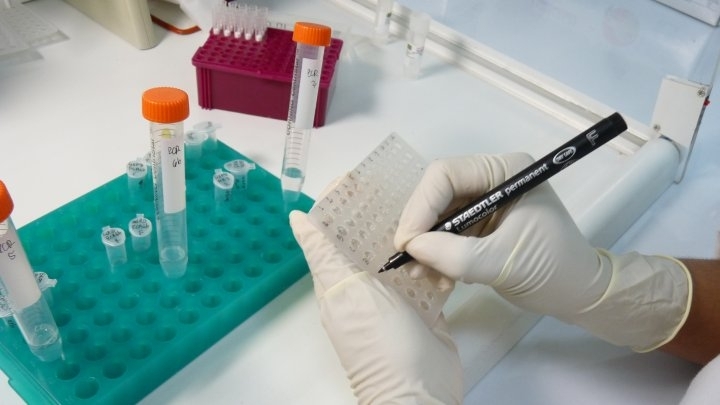


Initiative supported by FAPESP, USP, UNICAMP and global partners sets out to discover new molecules against tropical parasitic diseases. Its aim is to develop effective and affordable drugs (photo: Elizabeth Poll / MMV)
Published on 05/04/2021
By André Julião | Agência FAPESP – An international consortium has been set up to support the search for new drugs against Chagas disease, visceral leishmaniosis and malaria. Led by researchers at the University of Campinas (UNICAMP) and the University of São Paulo (USP) in Brazil, the initiative will be funded by FAPESP under the auspices of its Research Partnership for Technological Innovation (PITE) and two nonprofit organizations, the Drugs for Neglected Diseases initiative (DNDi) and the Medicines for Malaria Venture (MMV).
The initiative will last five years and will receive investments amounting to BRL 43.5 million over this period. FAPESP will invest BRL 7.8 million, while the DNDi and MMV together will invest BRL 12.8 million. UNICAMP and USP will jointly contribute BRL 22.9 million in research infrastructure and personnel costs.
“The goal is to discover new candidate drugs to treat tropical parasitic diseases. At FAPESP, we strongly value this kind of collaborative effort involving basic and applied research, as well as the people who will apply the results in practice,” said Carlos Henrique de Brito Cruz, FAPESP’s scientific director.
According to the most recent data from the World Health Organization (WHO), in 2017, there were 219 million cases of malaria, 2 million more than in the previous year. The disease killed 435,000 people worldwide, 93% in Africa. WHO also estimates that 8 million people are infected each year by Trypanosoma cruzi, the parasite that causes Chagas disease, most of them in Latin America, and that annually, there are some 2 million new cases of leishmaniosis in its various forms.
“Malaria, Chagas disease and leishmaniosis are associated with considerable morbidity and mortality. They’re epidemic diseases, especially in low-income countries, with a heavy clinical and economic burden and important consequences both for patients individually – children and pregnant women in many cases – and for public health in general,” said Luiz Carlos Dias, a professor at UNICAMP’s Chemistry Institute (IQ) and principal investigator for the project.
Dias’s laboratory will develop studies in chemistry to search for new molecules, while researchers at USP’s São Carlos Institute of Physics (IFSC) will perform biological tests in pharmacokinetics and toxicity, among others. The tests will be led by Adriano Andricopulo and Rafael Victorio Carvalho Guido, both professors at IFSC-USP.
The researchers are all affiliated with the Center for Innovation in Biodiversity and Drug Discovery (CIBFar), one of the research, innovation and dissemination centers (RIDCs) funded by FAPESP. The CIBFar principal investigator is Glaucius Oliva, also a professor at IFSC-USP.
Consortium
The DNDi and MMV are nonprofit organizations that fund research with partners on neglected diseases and malaria, respectively. Both have teams of specialists who collaborate on research to discover effective and affordable drugs.
“We’re really excited about the launch of this project, which will bring together scientists from Brazil, the MMV and the DNDi in the search for new candidate drugs to treat tropical parasitic diseases. The partnership will use the knowledge of Brazilian scientists in biology and synthetic chemistry, in synergy with that of specialists associated with the organizations in centers of excellence around the world. They’ll be able to perform additional tests and bring in new knowledge. We’re focusing on Brazil, but the partnership will benefit people globally,” said Paul Willis, senior director at the MMV.
“The organizations involved in this project share a vision, which is to help patients who are suffering from malaria and neglected diseases. We had the opportunity to bring outstanding scientists together, and so, we set up this consortium with UNICAMP, USP São Carlos, and other partners,” said Charles Mowbray of the DNDi.
The aim is for candidate drugs to be single-dose effective. Some drugs now on the market are effective but require several doses, making treatment difficult and creating parasite resistance.
“The patient improves after the first dose and stops taking the medication. The disease not only returns but also becomes more aggressive,” Dias said. “To be really effective, a drug must kill the parasite completely with a single dose.”
After the five-year project, researchers expect to have molecules ready for clinical trials. The idea is to then enter into new partnerships to fund clinical trials and bring the drugs to market, necessarily at low cost.
The agreement signature event was also attended by Sylvio Canuto, USP’s Vice President for research, and Daniel Martins de Souza, a professor in UNICAMP’s Biology Institute and an advisor to the VP for research at UNICAMP.
Source: https://agencia.fapesp.br/32265